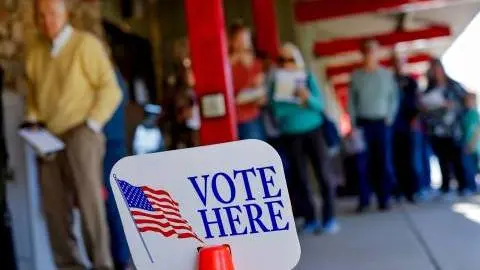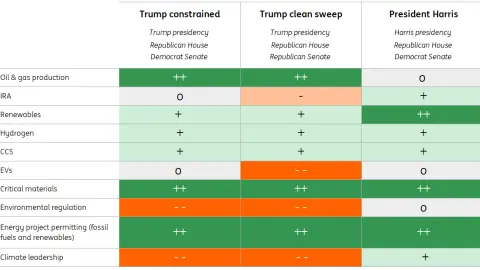How the US election could impact the energy transition
No matter who becomes president, the US energy transition is expected to continue. The Inflation Reduction Act will drive clean energy development and technology onshoring will weigh more on energy and climate policymaking. Still, companies need to watch out for regulation and incentive rollbacks
Be prepared for policy disruption
The US has long been subject to material policy inconsistency through presidential election cycles. Most recently, the Biden administration reversed a series of Trump-era energy and climate policies, signed into law the landmark Inflation Reduction Act (IRA), which has spurred $200bn of investment in clean energy manufacturing, strengthened regulations on several dirty economic activities, and is undergoing efforts to mandate climate data reporting.
Now, with the 2024 elections approaching and the recent confirmation of Kamala Harris as the presidential candidate for the Democrat Party, the US clean energy market is again subject to policy disruption.
As corporates and investors seek future resiliency for their business and investment decisions, it is important to understand what sections of the US clean energy policy may substantially change with the elections, and which may stay intact.
Regardless of who becomes president, the IRA is unlikely to be repealed and will continue to be a key piece of legislation facilitating the development of clean energy in the US. Meanwhile, onshoring key technologies and strengthening critical mineral supply chains will be a priority for both candidates. Streamlining permitting processes for energy projects will also have bipartisan support.
But there will still be differences in how Harris and Trump handle energy policymaking. We will unpack the policy differences in the four possible scenarios. In a nutshell, incentives for electric vehicles (EVs) and various clean energy loan programmes are at high risk of being scaled back under a Trump presidency, while incentives for technologies such as hydrogen and carbon capture and storage (CCS) would be less impacted. Renewable energy can get continued tax credits, though efforts toward grid modernisation would be weakened with Trump in the White House.
US elections: how supportive will policies energy and climate policies become?

With most parts of the economy deploying clean technology right now, the US is undergoing a structural change where it is difficult to "cancel" the energy transition. But the big question is how much election cycles will affect the speed of the transition. Understanding the policy dynamics and underlying divers can help companies future-proof their businesses.
How to contextualise the energy transition under fiscal deficit concerns and weak investment in the US
The fiscal deficit is set to exceed 6% again this year despite the economy recording robust growth with low unemployment. Neither candidate appears to be proposing policies that will return government borrowing to a more sustainable position quickly, so net interest costs look set to soar in an environment of higher interest rates. Should debt sustainability concerns come to the fore and spending cuts are required, major projects will be vulnerable.
The IRA is no doubt having and will continue to have a profound impact on the energy, infrastructure, and manufacturing sectors, among others. However, the size of the IRA is not large enough to have had a meaningful impact on the general investment environment. It might take longer for the positive impact to be reflected on a larger scale.
This publication has been prepared by ING solely for information purposes irrespective of a particular user's means, financial situation or investment objectives. The information does not constitute investment recommendation, and nor is it investment, legal or tax advice or an offer or solicitation to purchase or sell any financial instrument. Read more
Download
Download article
10 September 2024
US election round-up This bundle contains 7 Articles

